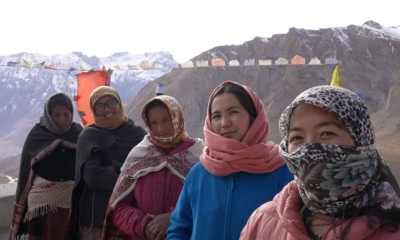Features
Some incomprehensible lapses in Easter Attack Commission Report
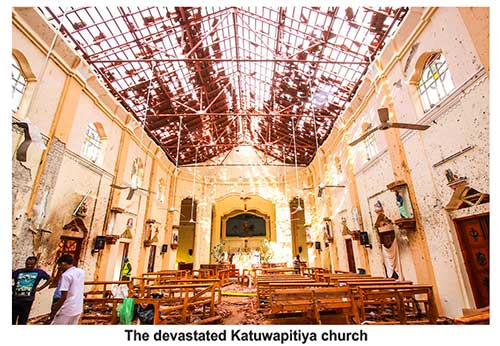
By Kalyananda Tiranagama
The Presidential Commission of Inquiry on Easter Sunday Attack (PCoI) had the difficult and challenging task of going through a vast amount of evidence, both oral and documentary, of several hundred witnesses, identifying the persons and organizations involved in the attack and the circumstances that brought about the situation culminating in the attack, and the political leaders and state officials whose dereliction of duty and responsibility resulting in the failure to take necessary action to prevent the attack in time and making necessary recommendations for taking legal action against them and for preventing recurrence of such situations.
In its Final Report submitted to the government, the PCoI had made a large number of relevant, important, useful and implementable recommendations, some of which the government has already taken steps to implement such as arresting some of the persons and proscribing some organizations mentioned therein. The Commission has done a commendable job by presenting this report.
While the Commission was conducting its inquiries summoning witnesses and recording their evidence at length giving wide publicity through the media, the people of the country expected that the Commission would identify all the culprits responsible for the attack, not only those who carried out the terrorist acts, but all those who were involved in or contributed to it directly or indirectly in various ways by facilitating, aiding and abetting, providing financial, material or moral support, within the country and from outside, to the terrorist group that carried out the attack; the links they had with communalist Muslim political parties and their leaders; and the foreign involvements in the attack. The people also expected it to identify the political leaders and public officials accountable for this attack by their failure to take necessary action to prevent it even after having received information in advance and deal with them according to law.
However, when a person with some legal background reads this report with an analytical mind, one finds that there are several incomprehensible lapses, omissions and lacunae in it. The purpose of this article is to point out some of the lapses that one would come across while going through this report.
Persons directly connected to terrorist attacks
In its Final Report the Commission has identified 14 persons as persons directly connected with the terrorist acts that took place on Easter Sunday. Out of them 11 persons are dead:
Zaharan and Ilham Ibrahim – suicide bombers in Shangrila attack;
Inshaf Ibrahim – Cinnamon Grand bomber; Mubarak – Kingsbury bomber;
Jameel – Dehiwala Tropical Inn bomber; Muath – Kochchikade bomber;
Hasthun – Katuwapitiya bomber;
Azad – Batticaloa Zion Church bomber;
Rilwan, Shaini and Niyas – died in Saindumarudu explosion.
Only three persons remain in custody to be prosecuted:”
(i)
Mohammed Ibrahim Mohammed Naufer – who has lectured on IS ideology and its activities in all the training camps conducted by Zaharan group;
(ii) (ii) Hayathu Mohammadu Ahamadu Milhan – who has acted as the weapons trainer in about 12 training camps conducted by Zaharan, played a key role in establishing the training camp at Wanathavilluwa and preparing explososives and procuring chemicals for the manufacture of bombs and taken part in the killing of two Police officers at Vavunativu in November 2018.
(iii) (iii) Mohomed Ibrahim Sadeeq Abdulla – an active member of Jamaath Islamia Students Movement (SLJISM), who had gone to Syria via Turkey in 2014 and undergone arms training; and participated in two training camps conducted by Zaharan and conducted some more camps in 2017 and 2018 on his own.
Persons and Organisations that contributed to terrorist acts
The PCoI has identified
the following as organizations and persons that contributed to the terrorist attacks by aiding and abetting actions which caused racial and religious disturbances or by giving support to such acts within the country and created public unrest and disturbed social order:
(i) Sri Lanka Jamaat-e-Islami (SLJI)
SLJI is an organization working on the same ideology as Muslim Brotherhood, a terrorist organization banned in Egypt, and having close connections with persons and organizations having the same ideology in Egypt, Saudi Arabia, Kuwait, Qatar, India and Pakistan. The final goal of the SLJI is establishment of an Islam state in Sri Lanka. The official publication of SLJI, Al Hassanat has over the years carried articles glorifying jihad. In February 1990 it has published an article stating that the establishment of an Islamic state cannot be done without waging jihad. In November 1999 it has carried an editorial criticizing the worshipping of statues and praising those who break them. In February 2001 it has published an article extolling people who sacrifice their lives for Islam and stating that they will be given 72 virgins in heaven. In June 2008 it has stated quoting Egyptian terrorist Al Qardawi that a suicide attack is a great act of jihad. It has established Arabic Schools in Madampe, Mawanella and Kalkudah. At the Arabic School in Madampe students were taught about the establishment of an Islamic state and it was compulsory to learn to fight with weapons – P. 227 – 228.
(ii) Sri Lanka Jamaat-e-Islami Students Movement (SLJISM)
SLJISM is the students’ wing of the SLJI. Many of the participants in training programmes conducted by Zaharan and several of the suspects in custody over the Easter Sunday attacks are members of the SLJI. About 15 members of the SLJISM are in custody over the Easter attack, some of them have gone to Syria for arms training and Mufees, the person who provided the land at Wanathavilluwa where explosives and weapons found was a member of SLJISM. – P. 238
The COI has recommended proscription of SLJI and SLJISM.
Persons:
(i) Ahamed Talib Lukman Thalib (father);
(ii) (ii) Lukman Thalib Ahamed (son) – 2 persons of Sri Lankan origin domiciled in Australia –who have facilitated several members of SLJISM to proceed to Syria via Turkey for arms training;
(iii) (iii) one Rimsan, a Sri Lankan connected to Al Qaida. The COI has recommended in the on-going criminal investigations to examine their role, if any, in the Easter Sunday attacks.
(iv) Rasheed Hajjul Akbar – the leader of SLJI from 1994 till August 2018. He was a member of the Shura Council of the SLJI. Hajjul Akbar is one of the main ideologists of Islamic extremism in Sri Lanka, promoting religious hatred and intolerance, application of Sharia law and establishing an Islamic state in Sri Lanka. Under his leadership, the official journal of SLJI Al Hassanat has published articles promoting extremism and terrorism. He had been arrested by the CCD on August 25, 2019 and released on September 27, 2019. His younger brother is Moulavi Rasheed Mohamed Ibrahim. Moulavi Ibrahim and his two sons Sadeek Abdulla and Shahid Abdulla are in custody for damaging Buddha statues in Mawanella in December 2018. The COI has recommended the AG to consider instituting criminal action against Rasheed Hajjul Akbar for conspiring to establish an Islamic state in Sri Lanka.
(v) Dr. Muhamad Zufyan Muhamad Zafras – working at the National Hospital, Colombo who has helped Zaharan’s brother Rilwan to get admitted to Colombo National Hospital for treatment as a person injured in a gas cylinder blast, hiding the fact that he was injured in a blast while experimenting with explosives. The COI has recommended the AG to consider instituting criminal action against Dr. Zafras under S. 5 of the PTA for withholding information.
Accountability of Authorities for Failure to Prevent Attacks
Political Authorities
As for the political authorities in government accountable for the failure to prevent the terrorist attacks, the PCoI has found only President Maithripala Sirisena accountable: President Maithripala Sirisena – failed in his duties and responsibilities, transcending beyond mere civil negligence – P 263. There is criminal liability on his part for the acts or omissions mentioned therein and the COI recommends the Attorney General instituting criminal action under the Penal Code against him. -P 265
Senior Public Officers
The COI has recommended the AG to consider instituting criminal action under any suitable Penal Code provision against three senior public officers:
(i)
Secretary Defence Hemasiri Fernando – P. 284;
(ii)
DIG Sisira Mendis, Chief of National Intelligence – P. 285;
(iii)
SDIG Nilantha Jayawardane, Director, State Intelligence Service – P, 288.
Law Enforcement Officers
Out of the Law Enforcement Officers held accountable by the PCoI for their failure to take necessary steps to prevent the attacks in their respective areas, recommendation has been made only against the Inspector General of Police Pujitha Jayasundara for the AG to consider instituting criminal action under any suitable Penal Code provision. – P. 308
In respect of 6 other Police Officers recommendation has been made for the AG to consider instituting criminal action under any suitable Penal Code provision or S. 82 of the Police Ordinance. The following Police Officers belong to this category:
(i)
SDIG Nandana Munasinghe – Western Province – P. 312;
(ii)
SP Sanjeewa Bandara – Superintendant of Police, Colombo North – P. 314;
(iii)
SSP Negombo – Chandana Athukorala – P. 315;
(iv)
SP B. E. I. Prasanna, Western Province Intelligence Division – P. 315;
(v)
Chief Inspector Sarath Kumarasinghe, Acting OIC, Fort Police Station – P.320;
(vi)
Chief Inspector Sagara Wilegoda Liyanage, OIC, Fort
The AG has the option of instituting criminal action under any suitable Penal Code provision or under S. 82 of the Police Ordinance. If the AG decides to institute action under S. 82 of the Police Ordinance, they will not be indicted and there will be no criminal proceedings against them. They will be charged in the Magistrate’s Court for breach of duty under S. 82 of the Police Ordinance:
–
S. 82 :– Every Police officer (a) guilty of any violation of duty or wilful breach or neglect of any regulations and lawful orders of other competent authority – shall be liable to a penalty not exceeding three month’s pay, or to imprisonment with or without hard labour, for period not exceeding three months, or both.
Against three other Police Officers only disciplinary inquiry has been recommended:
(i)
DIG Deshbandu Tennekone, Colombo North;
(ii)
Negombo ASP Sisila Kumara;
(iii)
Chaminda Nawaratne, OIC, Katana
Accountability of Prime Minister Ranil Wickremasinghe and the Cabinet of Ministers
As for the responsibility and failures of the Prime Minister Ranil Wickremasinghe no such recommendation, as made against the President, has been made.
It appears from the following observations of the PCoI that it has shown a very lenient attitude towards the failures of the Prime Minister. The report states: ‘The reasons for the Prime Minister Ranil Wickremasinghe’s inability to attend meetings of the National Security Council when fixed at short notice due to other commitments – acceptable; Though he did not explain why he did not stay on for some of full meetings, this taken in isolation is insufficient to make any adverse findings against him – P. 268; There are other instances reflecting lenient approach on his part to national security issues: No positive action taken to prevent Wahabi violence against traditional Sufi Muslim community though he was aware of it; Did not accept army intelligence presentations about the rising Islam extremism in the country, particularly in the East – P. 270; He opposed the issue of banning nikab and burkha raised by the Army Commander at the National Security Council without consulting Muslim parties – P. 271; Govt. did not ban IS organization in Sri Lanka as there were no reports stating IS propaganda taking place in Sri Lanka, only reports of individuals spreading IS ideology; It was corroborated by several witnesses that the Govt was reluctant to take strong action against rising Islamic extremism due to its dependence on support of Muslim political parties.’
However, the Report states: ‘The lax approach of the Prime Minister towards Islam extremism was one of the primary reasons for the failure on the part of the government to take proactive steps towards Islam extremism. This facilitated the build-up of Islam extremism to the point of Easter Sunday attacks.’ – P. 277
– If it is so, why no action is recommended against Prime Minister Ranil?
– It has totally ignored the fact that, though Maithripala Sirisena was the President, the Prime Minister Ranil Wickremasinghe had the effective control of the entire government in his hands under the 19th Amendment, controlling the Cabinet and the Parliament.
– Sagala Ratnayake, a close confidante of the Prime Minister in the UNP, was the Minister of Law and Order in charge of the Police.
The Accountability of the Cabinet of Ministers
The PCoI has not given its mind as to whether the Cabinet of Ministers has contributed in any manner to the terrorist attack by its failure to discharge its Constitutional responsibility. When it examined the accountability of the President and the Prime Minister, one finds it difficult to understand why it did not examine the accountability of the governemtn headed by the Cabinet of Ministers, especially in view of the relevant provisions in Article 42 of the Constitution and the evidence placed before it.
Article 42 (1) There shall be a Cabinet of Ministers charged with the direction and control of the government of the Republic;
(2) The Cabinet of Ministers shall be collectively responsible and answerable to Parliament;
(3) The President shall be a member the Cabinet of Ministers and shall be the Head of the Cabinet of Ministers.
IGP Pujitha Jayasundara sent the communication received from Senior DIG Nilantha Jayawardana, Head of the State Intelligence Services and from Sisira Mendis, the Chief of National Intelligence containing detailed information warning about a threat of possible terrorist attack by ISIS terrorists in Sri Lanka received from Indian Intelligence sources with a note stating ‘FNA’ on 09. 04. 2019 itself to four Senior Police Officers: i. SDIG Western Province – Nandana Munasinghe; ii. SDIG Crimes, Organized Crimes and STF – M. Latheef; iii. SDIG Special Protection Range – Priyalal Dasanayake; iv. Director – Counter Terrorism Investigation Division – Waruna Jayasundara – P. 303.
Special Protection Range is the Ministerial Security Division (MSD) which provides security to Ministers of the Cabinet. It was reported in the media that SDIG Priyalal Dasanayake, giving evidence before the Commission, stated that he had conveyed the information received of the threat of possible terrorist attack to all the officers of the Ministerial Security Division on April 9, 2019 itself.
Of the four Senior Officers who received the said communication from the IGP, the PCoI has recommended to the AG to consider instituting criminal action under any suitable Penal Code provision or S. 82 of the Police Ordinance against SDIG Western Province – Nandana Munasinghe;. – P. 312. As for the conduct of SDIG Crimes, Organized Crimes and Commander STF – M. Latheef, the Report contains the following comment: ‘When the COI queried the steps taken with regard to it (the IGP’s communication) the response was that he got in touch with the Indian High Commission and provided security to it. However, it is surprising as to why he did not instruct his intelligence units to work on the intelligence received.’ – P. 309. No recommendation made against him.
However, the final report does not mention anything about the steps taken by SDIG Priyalal Dasanayake on the information conveyed to him. It does not show whether COI made any query as to whether the officers of the Ministerial Security Division conveyed the information received by them to the Ministers to whom they provide security and the reaction of the Ministers concerned. This is highly relevant and a serious lacuna in the report. One cannot expect or believe that none of the officers of the Ministerial Security Division conveyed this information received by them to any of the Ministers. At least we know that Minister Harin Fernando’s father had got this information from a Police officer, and that he conveyed it to his son preventing him from going to church on that fateful day.
The entire Cabinet of Ministers cannot evade responsibility for their failure in their Constitutional duty. Though they may not be legally accountable, their conduct is highly irresponsible, immoral and blameworthy.
However, the Cabinet Sub-Committee appointed by the present government to study the Report of the COI and identify recommendations for implementation has also expressed its view that the entire government then in power was accountable for the failure to prevent the Easter Attack.
(To be concluded tomorrow)
Features
Meet the women protecting India’s snow leopards
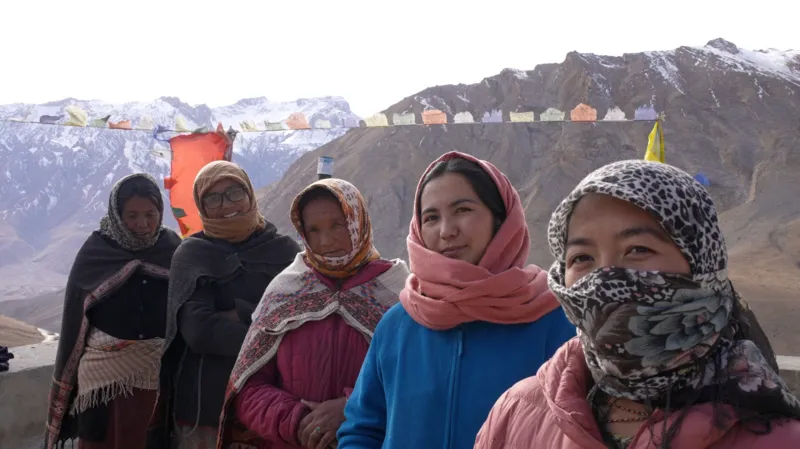
In one of India’s coldest and most remote regions, a group of women have taken on an unlikely role: protecting one of Asia’s most elusive predators, the snow leopard.
Snow leopards are found in just 12 countries across Central and South Asia. India is home to one of the world’s largest populations, with a nationwide survey in 2023 – the first comprehensive count ever carried out in the country – estimating more than 700 animals, .
One of the places they roam is around Kibber village in Himachal Pradesh state’s Spiti Valley, a stark, high-altitude cold desert along the Himalayan belt. Here, snow leopards are often called the “ghosts of the mountains”, slipping silently across rocky slopes and rarely revealing themselves.
For generations, the animals were seen largely as a threat, for attacking livestock. But attitudes in Kibber and neighbouring villages are beginning to shift, as people increasingly recognise the snow leopard’s role as a top predator in the food chain and its importance in maintaining the region’s fragile mountain ecosystem.
Nearly a dozen local women are now working alongside the Himachal Pradesh forest department and conservationists to track and protect the species, playing a growing role in conservation efforts.
Locally, the snow leopard is known as Shen and the women call their group “Shenmo”. Trained to install and monitor camera traps, they handle devices fitted with unique IDs and memory cards that automatically photograph snow leopards as they pass.
“Earlier, men used to go and install the cameras and we kept wondering why couldn’t we do it too,” says Lobzang Yangchen, a local coordinator working with a small group supported by the non-profit Nature Conservation Foundation (NCF) in collaboration with the forest department.
Yangchen was among the women who helped collect data for Himachal Pradesh’s snow leopard survey in 2024, which found that the state was home to 83 snow leopards – up from 51 in 2021.

The survey documented snow leopards and 43 other species using camera traps spread across an area of nearly 26,000sq km (10,000sq miles). Individual leopards were identified by the unique rosette patterns on their fur, a standard technique used for spotted big cats. The findings are now feeding into wider conservation and habitat-management plans.
“Their contribution was critical to identifying individual animals,” says Goldy Chhabra, deputy conservator of forests with the Spiti Wildlife Division.
Collecting the data is demanding work. Most of it takes place in winter, when heavy snowfall pushes snow leopards and their prey to lower altitudes, making their routes easier to track.
On survey days, the women wake up early, finish household chores and gather at a base camp before travelling by vehicle as far as the terrain allows. From there, they trek several kilometres to reach camera sites, often at altitudes above 14,000ft (4,300m), where the thin air makes even simple movement exhausting.
The BBC accompanied the group on one such trek in December. After hours of walking in biting cold, the women suddenly stopped on a narrow trail.
Yangchen points to pugmarks in the dust: “This shows the snow leopard has been here recently. These pugmarks are fresh.”
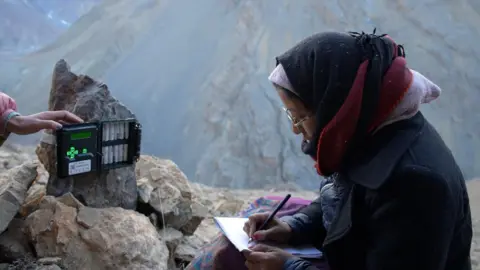
Along with pugmarks, the team looks for other signs, including scrapes and scent‑marking spots, before carefully fixing a camera to a rock along the trail.
One woman then carries out a “walk test”, crawling along the path to check whether the camera’s height and angle will capture a clear image.
The group then moves on to older sites, retrieving memory cards and replacing batteries installed weeks earlier.
By mid-afternoon, they return to camp to log and analyse the images using specialised software – tools many had never encountered before.
“I studied only until grade five,” says Chhering Lanzom. “At first, I was scared to use the computer. But slowly, we learned how to use the keyboard and mouse.”
The women joined the camera-trapping programme in 2023. Initially, conservation was not their motivation. But winters in the Spiti Valley are long and quiet, with little agricultural work to fall back on.
“At first, this work on snow leopards didn’t interest us,” Lobzang says. “We joined because we were curious and we could earn a small income.”
The women earn between 500 ($5.46; £4) and 700 rupees a day.
But beyond the money, the work has helped transform how the community views the animal.

“Earlier, we thought the snow leopard was our enemy,” says Dolma Zangmo, a local resident. “Now we think their conservation is important.”
Alongside survey work, the women help villagers access government insurance schemes for their livestock and promote the use of predator‑proof corrals – stone or mesh enclosures that protect animals at night.
Their efforts come at a time of growing recognition for the region. Spiti Valley has recently been included in the Cold Desert Biosphere Reserve, a Unesco-recognised network aimed at conserving fragile ecosystems while supporting local livelihoods.
As climate change reshapes the fragile trans-Himalayan landscape, conservationists say such community participation will be crucial to safeguarding species like the snow leopard.
“Once communities are involved, conservation becomes more sustainable,” says Deepshikha Sharma, programme manager with NCF’s High Altitudes initiative.
“These women are not just assisting, they are becoming practitioners of wildlife conservation and monitoring,” she adds.
As for the women, their work makes them feel closer to their home, the village and the mountains that raised them, they say.
“We were born here, this is all we know,” Lobzang says. “Sometimes we feel afraid because these snow leopards are after all predatory animals, but this is where we belong.”
[BBC]
Features
Freedom for giants: What Udawalawe really tells about human–elephant conflict
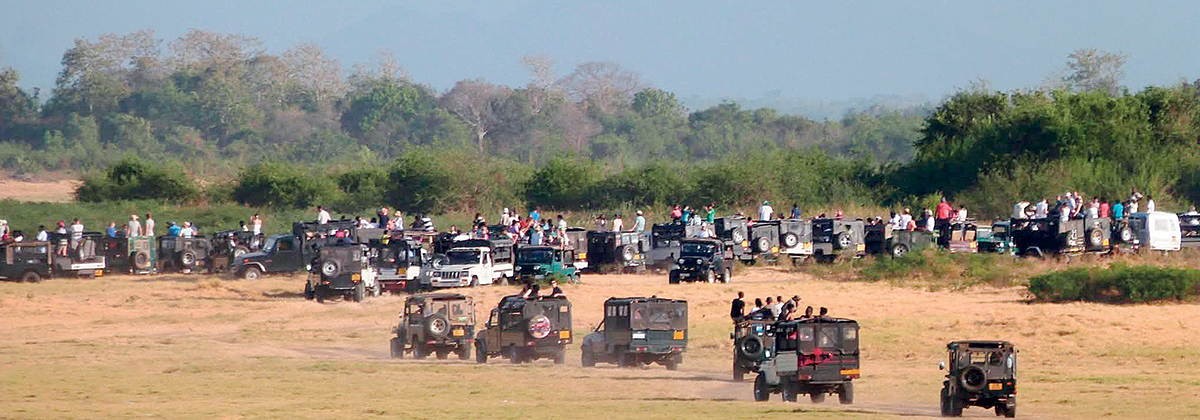
If elephants are truly to be given “freedom” in Udawalawe, the solution is not simply to open gates or redraw park boundaries. The map itself tells the real story — a story of shrinking habitats, broken corridors, and more than a decade of silent but relentless ecological destruction.
“Look at Udawalawe today and compare it with satellite maps from ten years ago,” says Sameera Weerathunga, one of Sri Lanka’s most consistent and vocal elephant conservation activists. “You don’t need complicated science. You can literally see what we have done to them.”
What we commonly describe as the human–elephant conflict (HEC) is, in reality, a land-use conflict driven by development policies that ignore ecological realities. Elephants are not invading villages; villages, farms, highways and megaprojects have steadily invaded elephant landscapes.
Udawalawe: From Landscape to Island
Udawalawe National Park was once part of a vast ecological network connecting the southern dry zone to the central highlands and eastern forests. Elephants moved freely between Udawalawe, Lunugamvehera, Bundala, Gal Oya and even parts of the Walawe river basin, following seasonal water and food availability.
Today, Udawalawe appears on the map as a shrinking green island surrounded by human settlements, monoculture plantations, reservoirs, electric fences and asphalt.
“For elephants, Udawalawe is like a prison surrounded by invisible walls,” Sameera explains. “We expect animals that evolved to roam hundreds of square nationakilometres to survive inside a box created by humans.”
Elephants are ecosystem engineers. They shape forests by dispersing seeds, opening pathways, and regulating vegetation. Their survival depends on movement — not containment. But in Udawalawa, movement is precisely what has been taken away.
Over the past decade, ancient elephant corridors have been blocked or erased by:
Irrigation and agricultural expansion
Tourism resorts and safari infrastructure
New roads, highways and power lines
Human settlements inside former forest reserves
“The destruction didn’t happen overnight,” Sameera says. “It happened project by project, fence by fence, without anyone looking at the cumulative impact.”
The Illusion of Protection
Sri Lanka prides itself on its protected area network. Yet most national parks function as ecological islands rather than connected systems.
“We think declaring land as a ‘national park’ is enough,” Sameera argues. “But protection without connectivity is just slow extinction.”
Udawalawe currently holds far more elephants than it can sustainably support. The result is habitat degradation inside the park, increased competition for resources, and escalating conflict along the boundaries.
“When elephants cannot move naturally, they turn to crops, tanks and villages,” Sameera says. “And then we blame the elephant for being a problem.”
The Other Side of the Map: Wanni and Hambantota
Sameera often points to the irony visible on the very same map. While elephants are squeezed into overcrowded parks in the south, large landscapes remain in the Wanni, parts of Hambantota and the eastern dry zone where elephant density is naturally lower and ecological space still exists.
“We keep talking about Udawalawe as if it’s the only place elephants exist,” he says. “But the real question is why we are not restoring and reconnecting landscapes elsewhere.”
The Hambantota MER (Managed Elephant Reserve), for instance, was originally designed as a landscape-level solution. The idea was not to trap elephants inside fences, but to manage land use so that people and elephants could coexist through zoning, seasonal access, and corridor protection.
“But what happened?” Sameera asks. “Instead of managing land, we managed elephants. We translocated them, fenced them, chased them, tranquilised them. And the conflict only got worse.”
The Failure of Translocation
For decades, Sri Lanka relied heavily on elephant translocation as a conflict management tool. Hundreds of elephants were captured from conflict zones and released into national parks like Udawalawa, Yala and Wilpattu.
The logic was simple: remove the elephant, remove the problem.
The reality was tragic.
“Most translocated elephants try to return home,” Sameera explains. “They walk hundreds of kilometres, crossing highways, railway lines and villages. Many die from exhaustion, accidents or gunshots. Others become even more aggressive.”
Scientific studies now confirm what conservationists warned from the beginning: translocation increases stress, mortality, and conflict. Displaced elephants often lose social structures, familiar landscapes, and access to traditional water sources.
“You cannot solve a spatial problem with a transport solution,” Sameera says bluntly.
In many cases, the same elephant is captured and moved multiple times — a process that only deepens trauma and behavioural change.
Freedom Is Not About Removing Fences
The popular slogan “give elephants freedom” has become emotionally powerful but scientifically misleading. Elephants do not need symbolic freedom; they need functional landscapes.
Real solutions lie in:
Restoring elephant corridors
Preventing development in key migratory routes
Creating buffer zones with elephant-friendly crops
Community-based land-use planning
Landscape-level conservation instead of park-based thinking
“We must stop treating national parks like wildlife prisons and villages like war zones,” Sameera insists. “The real battlefield is land policy.”
Electric fences, for instance, are often promoted as a solution. But fences merely shift conflict from one village to another.
“A fence does not create peace,” Sameera says. “It just moves the problem down the line.”
A Crisis Created by Humans
Sri Lanka loses more than 400 elephants and nearly 100 humans every year due to HEC — one of the highest rates globally.
Yet Sameera refuses to call it a wildlife problem.
“This is a human-created crisis,” he says. “Elephants are only responding to what we’ve done to their world.”
From expressways cutting through forests to solar farms replacing scrublands, development continues without ecological memory or long-term planning.
“We plan five-year political cycles,” Sameera notes. “Elephants plan in centuries.”
The tragedy is not just ecological. It is moral.
“We are destroying a species that is central to our culture, religion, tourism and identity,” Sameera says. “And then we act surprised when they fight back.”
The Question We Avoid Asking
If Udawalawe is overcrowded, if Yala is saturated, if Wilpattu is bursting — then the real question is not where to put elephants.
The real question is: Where have we left space for wildness in Sri Lanka?
Sameera believes the future lies not in more fences or more parks, but in reimagining land itself.
“Conservation cannot survive as an island inside a development ocean,” he says. “Either we redesign Sri Lanka to include elephants, or one day we’ll only see them in logos, statues and children’s books.”
And the map will show nothing but empty green patches — places where giants once walked, and humans chose. roads instead.
By Ifham Nizam
Features
Challenges faced by the media in South Asia in fostering regionalism
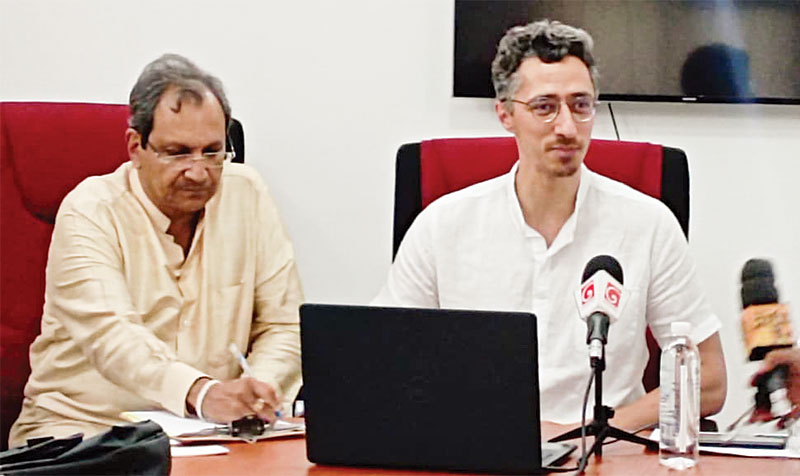
 SAARC or the South Asian Association for Regional Cooperation has been declared ‘dead’ by some sections in South Asia and the idea seems to be catching on. Over the years the evidence seems to have been building that this is so, but a matter that requires thorough probing is whether the media in South Asia, given the vital part it could play in fostering regional amity, has had a role too in bringing about SAARC’s apparent demise.
SAARC or the South Asian Association for Regional Cooperation has been declared ‘dead’ by some sections in South Asia and the idea seems to be catching on. Over the years the evidence seems to have been building that this is so, but a matter that requires thorough probing is whether the media in South Asia, given the vital part it could play in fostering regional amity, has had a role too in bringing about SAARC’s apparent demise.
That South Asian governments have had a hand in the ‘SAARC debacle’ is plain to see. For example, it is beyond doubt that the India-Pakistan rivalry has invariably got in the way, particularly over the past 15 years or thereabouts, of the Indian and Pakistani governments sitting at the negotiating table and in a spirit of reconciliation resolving the vexatious issues growing out of the SAARC exercise. The inaction had a paralyzing effect on the organization.
Unfortunately the rest of South Asian governments too have not seen it to be in the collective interest of the region to explore ways of jump-starting the SAARC process and sustaining it. That is, a lack of statesmanship on the part of the SAARC Eight is clearly in evidence. Narrow national interests have been allowed to hijack and derail the cooperative process that ought to be at the heart of the SAARC initiative.
However, a dimension that has hitherto gone comparatively unaddressed is the largely negative role sections of the media in the SAARC region could play in debilitating regional cooperation and amity. We had some thought-provoking ‘takes’ on this question recently from Roman Gautam, the editor of ‘Himal Southasian’.
Gautam was delivering the third of talks on February 2nd in the RCSS Strategic Dialogue Series under the aegis of the Regional Centre for Strategic Studies, Colombo, at the latter’s conference hall. The forum was ably presided over by RCSS Executive Director and Ambassador (Retd.) Ravinatha Aryasinha who, among other things, ensured lively participation on the part of the attendees at the Q&A which followed the main presentation. The talk was titled, ‘Where does the media stand in connecting (or dividing) Southasia?’.
Gautam singled out those sections of the Indian media that are tamely subservient to Indian governments, including those that are professedly independent, for the glaring lack of, among other things, regionalism or collective amity within South Asia. These sections of the media, it was pointed out, pander easily to the narratives framed by the Indian centre on developments in the region and fall easy prey, as it were, to the nationalist forces that are supportive of the latter. Consequently, divisive forces within the region receive a boost which is hugely detrimental to regional cooperation.
Two cases in point, Gautam pointed out, were the recent political upheavals in Nepal and Bangladesh. In each of these cases stray opinions favorable to India voiced by a few participants in the relevant protests were clung on to by sections of the Indian media covering these trouble spots. In the case of Nepal, to consider one example, a young protester’s single comment to the effect that Nepal too needed a firm leader like Indian Prime Minister Narendra Modi was seized upon by the Indian media and fed to audiences at home in a sensational, exaggerated fashion. No effort was made by the Indian media to canvass more opinions on this matter or to extensively research the issue.
In the case of Bangladesh, widely held rumours that the Hindus in the country were being hunted and killed, pogrom fashion, and that the crisis was all about this was propagated by the relevant sections of the Indian media. This was a clear pandering to religious extremist sentiment in India. Once again, essentially hearsay stories were given prominence with hardly any effort at understanding what the crisis was really all about. There is no doubt that anti-Muslim sentiment in India would have been further fueled.
Gautam was of the view that, in the main, it is fear of victimization of the relevant sections of the media by the Indian centre and anxiety over financial reprisals and like punitive measures by the latter that prompted the media to frame their narratives in these terms. It is important to keep in mind these ‘structures’ within which the Indian media works, we were told. The issue in other words, is a question of the media completely subjugating themselves to the ruling powers.
Basically, the need for financial survival on the part of the Indian media, it was pointed out, prompted it to subscribe to the prejudices and partialities of the Indian centre. A failure to abide by the official line could spell financial ruin for the media.
A principal question that occurred to this columnist was whether the ‘Indian media’ referred to by Gautam referred to the totality of the Indian media or whether he had in mind some divisive, chauvinistic and narrow-based elements within it. If the latter is the case it would not be fair to generalize one’s comments to cover the entirety of the Indian media. Nevertheless, it is a matter for further research.
However, an overall point made by the speaker that as a result of the above referred to negative media practices South Asian regionalism has suffered badly needs to be taken. Certainly, as matters stand currently, there is a very real information gap about South Asian realities among South Asian publics and harmful media practices account considerably for such ignorance which gets in the way of South Asian cooperation and amity.
Moreover, divisive, chauvinistic media are widespread and active in South Asia. Sri Lanka has a fair share of this species of media and the latter are not doing the country any good, leave alone the region. All in all, the democratic spirit has gone well into decline all over the region.
The above is a huge problem that needs to be managed reflectively by democratic rulers and their allied publics in South Asia and the region’s more enlightened media could play a constructive role in taking up this challenge. The latter need to take the initiative to come together and deliberate on the questions at hand. To succeed in such efforts they do not need the backing of governments. What is of paramount importance is the vision and grit to go the extra mile.
-

 Business6 days ago
Business6 days agoHayleys Mobility ushering in a new era of premium sustainable mobility
-

 Business3 days ago
Business3 days agoSLIM-Kantar People’s Awards 2026 to recognise Sri Lanka’s most trusted brands and personalities
-

 Business6 days ago
Business6 days agoAdvice Lab unveils new 13,000+ sqft office, marking major expansion in financial services BPO to Australia
-

 Business6 days ago
Business6 days agoArpico NextGen Mattress gains recognition for innovation
-

 Business5 days ago
Business5 days agoAltair issues over 100+ title deeds post ownership change
-

 Editorial6 days ago
Editorial6 days agoGovt. provoking TUs
-

 Business5 days ago
Business5 days agoSri Lanka opens first country pavilion at London exhibition
-

 Business4 days ago
Business4 days agoAll set for Global Synergy Awards 2026 at Waters Edge




